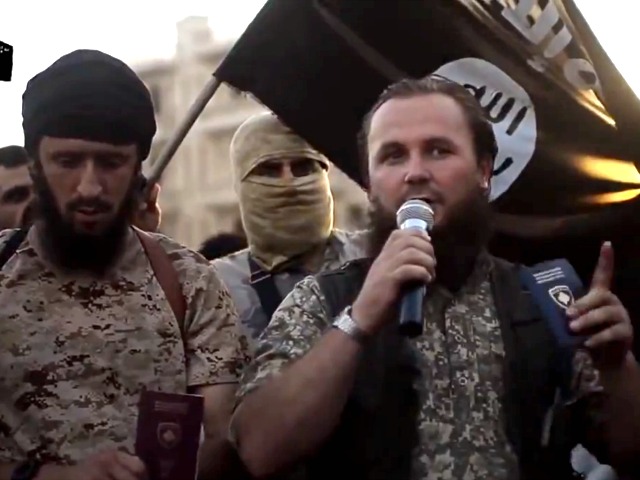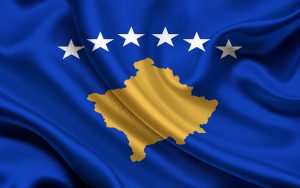
Views: 2104
As Kosovo tries to stop its sons from going off to fight in Iraq and Syria, sympathy for their cause remains strong among some hardline Muslims.
The calls stopped coming more than three months ago.
Even while fighting in Iraq and Syria for the militants of Islamic State, Musli Musliu still checked in with his family regularly. He used to post photos on Facebook, showing a beaming young man posing with his comrades. One even shows him in a sweet shop.
It was during one of those calls, in April, that he broke the news that his brother, Valon, had been killed. The two had been fighting alongside each other in Iraq when Valon died. Musli said he had buried him there, too.
Musli has since gone silent, leaving his family to wonder he has shared the same fate as his Valon.
Their brother, Selman, speaks softly when he talks about Musli and Valon outside the family home in the village of Tushile, 50 kilometers west of Prishtina. Selman says their mother is taking it hardest. “She’s suffering a lot with the loss of Valon,” Selman said.
Both Musli and Valon had embraced a strict form of Islam. Valon had gone to a Medressa and had chosen to fight to “protect the word of God,” said another brother, Muhamet, expressing pride in his siblings.
Some 150 Kosovars have gone to fight in Syria and Iraq, primarily for Islamic State, or for the al-Qaeda-linked al-Nusra Front, according to the Kosovo Intelligence Agency. Around 40 have died in what has become an increasingly dangerous war, with a US-led coalition of countries now attacking both groups via air strikes.
Meanwhile, Kosovo itself is becoming more hostile to those who have fought in Syria and Iraq, or who plan to. Police have arrested dozens of people in recent weeks, including imams and others accused of helping recruit fighters.
This week, President Atifete Jahjaga appeared on Fox News Channel in the US, declaring: “We are taking this threat very seriously and our security mechanisms are working around the clock to address this challenge.”
Kosovars make up only a tiny portion of the thousands of foreign fighters in Syria and Iraq, far outnumbered by those coming from Western European countries, including Belgium, the UK and France. They have nevertheless become a national embarrassment for a Muslim-majority country that wants to present itself as a secular, progressive European democracy.
A particular source of embarrassment is the leader of the Albanian fighters, Lavdrim Muhaxheri, who this summer posted photographs on Facebook, appearing to show him beheading a captive, with a message encouraging others to come join the fight. It followed a video showing him delivering a firebrand speech in Arabic and tearing up his Kosovo passport.
As outrage has grown across the world at the sheer brutality of Islamic State’s campaign to establish a so-called caliphate in Syria and Iraq, it has only hardened the resolve of the Kosovo authorities, and of mainstream leaders in the Muslim community. “This is the right moment,” an official in the Kosovo Intelligence Agency, said, referring to the official crackdown.
Fighters coming for years
Since the civil war there erupted in 2011, it has been remarkably easy for people to travel from Kosovo to join the fight. In November 2012, Naman Demoll became the first Kosovar to die in the Syrian civil war.
The intelligence official noted that it is cheap – requiring only about 100 euros to get from Kosovo to the war zone, with a flight to Istanbul and then a bus to the Syrian border.
The same official says the practice was long largely ignored because no special law exists barring such activities. Until recently, the Turkish authorities also did little to stop would-be fighters from entering Turkey.
The official said there had been multiple cases of Turkish authorities letting Kosovars into the country after being provided with intelligence of their intention to fight in Syria or Iraq.
As for fighters who have returned to Kosovo, the official said most of them have returned to a quiet life. But a small number have come back further radicalized, complete with combat experience and a new disdain for the state.
The official said they have disrupted three terrorist plots involving former fighters already. With a series of high profile arrests in September and August, the official says the members of two terror cells are now in custody, with a third potential cell remaining in Syria or Iraq.
The same official said he believes about 30 Kosovars are still fighting for Islamic State or Al-Nursa. But, with the authorities now arresting and prosecuting fighters, the official says it is unlikely any of them will return to Kosovo. Those remaining have effectively bought themselves a “one-way ticket,” the official said.
Sympathies remain
The town of Kacanik, near the Macedonian border, is known in Kosovo’s history as a place that put up stiff resistance to the Ottoman Empire – which brought Islam to Kosovo and ruled the Balkans for nearly 500 years.
These days, however, it is known as a centre of radical Islam and as the hometown of a large number men fighting in Syria and Iraq. Among them is their purported leader, Muhaxheri.
On a recent Friday, at afternoon prayers, few were willing to discuss those fighting in Syria or Iraq. But a young man, who refused to give his name, expressed openness to fighting for Islamic State.
“I would seriously think of going there if someone invited me,” he said. The young man says he has practiced Islam strictly for the past year-and-a-half and feels an affinity for Islamic State because “my heart feels for Sharia Law… My brother, I think ISIS is Allah’s will,” he continued.
The same man also drew parallels with the 1998-99 conflict, in which the Kosovo Liberation Army took on Yugoslav and Serbian forces. He says there is a similar imperative today to go to fight in the Middle East.
Mentor, a middle-aged man in Kacanik, agreed, comparing the intervention of NATO forces in Kosovo to Kosovars fighting in Syria in Iraq.
“When foreigners came to help us in Kosovo, no one complained at that time,” he said. “Now the Kosovars are doing the same thing. They are going to help liberate a people,” he said.
The Kosovo intelligence official agreed that the legacy of the war is one factor driving young Kosovars to fight abroad today.
“Most were very young when the Kosovo war happened. They want to try war – and feel it,” the official said, adding, however, that, based on the Intelligence Agency’s interviews, many come away disappointed.
For years, the leader of Kosovo’s Islamic Community, Naim Ternava, has drawn accusations of turning a blind eye to rise of extremism in the country’s mosques. Since the end of the war, strict forms of Islam, imported from and funded by the Middle East, have proliferated.
While the hardliners remain a minority among Kosovo’s Muslims, they have nevertheless become a visible and vocal presence. One of those arrested by police in September was Shefqet Krasniqi, the imam of the Grand Mosque, the largest in Prishtina.
In the wake of the arrests, however, Ternava has sharpened his rhetoric against the hardliners.
In a recent interview on Klan Kosova, Ternava warned of the rise of hardline Islam, brought in by people from outside Kosovo, “who have sown a sort of a seed of trouble.
“Now, that seed has somewhat grown up and is present. For instance, we have people who say the Kosovo Mufti is a nonbeliever because he does not grow beard,” he said. “This is not in line with real Islam; there are individuals who want to interpret Islam in very narrow terms, and to misinterpret Islam,” he added.
Skender Perteshi, of the Kosovar Center for Security Studies, blames a bad economy and a poor education system, as well as radicalised Islam, for creating the conditions that have sent Kosovars off to fight in Syria and Iraq.
He said recent police actions are encouraging. “It sends a message that the state is capable of coping with all the threats against the state, including terrorism,” he said.
It remains to be seen, however, if the crackdown stems the flow of fighters in the long term.
Muhamet Musliu remains proud of two of his brothers who went to fight in Iraq and Syria, even with one dead and another missing.
“They went to fight for Allah, to defend the words of Allah,” he said. “I wish I could go there but the moment of destiny has not come yet.”
Originally published on 2014-09-26
Authors: Nektar Zogjani, Petrit Collaku and Nate Tabak
Source: Balkan Insight
Origins of images: Facebook, Twitter, Wikimedia, Wikipedia, Flickr, Google, Imageinjection & Pinterest.
Read our Disclaimer/Legal Statement!
Donate to Support Us
We would like to ask you to consider a small donation to help our team keep working. We accept no advertising and rely only on you, our readers, to keep us digging the truth on history, global politics and international relations.
FOLLOW US ON OUR SOCIAL PLATFORMS











